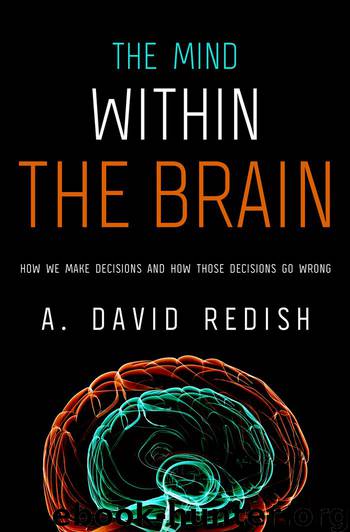The Mind within the Brain by Redish A. David

Author:Redish, A. David
Language: eng
Format: epub
Tags: How We Make Decisions and How Those Decisions Go Wrong
Publisher: Oxford University Press, USA
Published: 2013-03-26T16:00:00+00:00
Player 1 cooperates
Player 1 defects
Player 2 cooperates
Player 1 gets $50
Player 2 gets $50
Player 1 gets $80
Player 2 gets $0
Player 2 defects
Player 1 gets $0
Player 2 gets $80
Player 1 gets $0
Player 2 gets $0
Figure 23.3 The prisoner’s dilemma: positive version.
This is a form of group selection, in that even though the determination of selective success is completely based on the individual, certain groups do better than other groups. Groups that are successful may grow large enough to split into two groups, while groups that are not successful may destroy themselves from the inside. The evolutionary implications of this group-selection process is laid out most clearly in the book Unto Others, by Elliot Sober and David Sloan Wilson.
This theory, however, does predict that one is likely to be more cooperative with members of one’s own village or group rather than between villages or groups. This difference is called in-group altruism and out-group xenophobia. In his book Darwin’s Cathedral, David Sloan Wilson argues that one of the keys to humanity is the flexibility and complexity with which we define our groups. He argues that many of our societal constructs (religion, nationalism, culture, even sports franchises) are ways of defining who is in the in-group and who is not. In Darwin’s Cathedral, Wilson explicitly examines the development of Calvinism in the 1530s, where exile and ostracism were the main tools of ensuring in-group cooperative behavior.
In his book Historical Dynamics, Peter Turchin defines a term asabiya, which means “cohesion” or “group unity.” Turchin argues that the success of dynasties, tribes, nation-states, and groups depends on the willingness of individuals to sacrifice for the group. Turchin argues that groups, nation-states, tribes, and dynasties all have a cycle, where groups arise with a lot of asabiya (in-group cooperation), take over (because they are stronger together than other groups that cannot work together), but then lose that asabiya over a couple of generations (defectors spread within the group), which makes them vulnerable to the next group with asabiya.
This effect that Turchin is describing occurs because although everyone in the altruistic village will do better on average, a selfish person in the altruistic village is going to do even better than the altruists in that village.49 (That person will spend more time in the I-defect-you-cooperate entry in the interaction table. Think of the person who rides the government-built subway system to protest paying taxes.50) This sets up a conflict between levels: at the level of the villages, altruistic villages do better than other villages, but at the individual level, selfish defectors within that village do better than the altruists in that (mostly altruistic) village. There are two ways to deal with this problem (called the free-rider problem51): exile and altruistic punishment.
Exile entails identifying those defectors and explicitly pushing them out of the community. One of the major purposes of gossip seems to be the identification of such defectors.52 Exile forces the person out of the community, thus removing the person from the cooperate–cooperate entry in the table. Many groups
Download
This site does not store any files on its server. We only index and link to content provided by other sites. Please contact the content providers to delete copyright contents if any and email us, we'll remove relevant links or contents immediately.
When Breath Becomes Air by Paul Kalanithi(7288)
Why We Sleep: Unlocking the Power of Sleep and Dreams by Matthew Walker(5676)
Paper Towns by Green John(4187)
The Immortal Life of Henrietta Lacks by Rebecca Skloot(3839)
The Sports Rules Book by Human Kinetics(3608)
Dynamic Alignment Through Imagery by Eric Franklin(3509)
ACSM's Complete Guide to Fitness & Health by ACSM(3480)
Kaplan MCAT Organic Chemistry Review: Created for MCAT 2015 (Kaplan Test Prep) by Kaplan(3434)
Introduction to Kinesiology by Shirl J. Hoffman(3314)
Livewired by David Eagleman(3148)
The River of Consciousness by Oliver Sacks(3006)
Alchemy and Alchemists by C. J. S. Thompson(2921)
The Death of the Heart by Elizabeth Bowen(2917)
Descartes' Error by Antonio Damasio(2754)
Bad Pharma by Ben Goldacre(2739)
The Gene: An Intimate History by Siddhartha Mukherjee(2507)
Kaplan MCAT Behavioral Sciences Review: Created for MCAT 2015 (Kaplan Test Prep) by Kaplan(2497)
The Fate of Rome: Climate, Disease, and the End of an Empire (The Princeton History of the Ancient World) by Kyle Harper(2449)
The Emperor of All Maladies: A Biography of Cancer by Siddhartha Mukherjee(2445)
